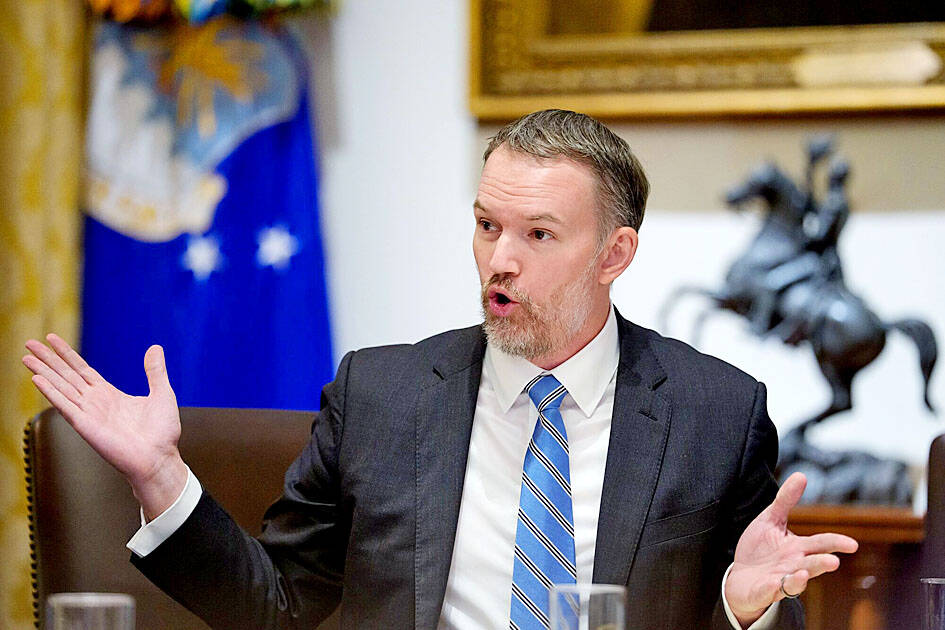US President Donald Trump’s administration is continuing its talks with trading partners despite a US appeals court ruling that most of Trump’s tariffs are illegal, US Trade Representative Jamieson Greer said on Sunday.
“Our trading partners, they continue to work very closely with us on negotiations,” he said in an interview with Fox News. “People are moving forward with their deals, regardless of what this court may say in the interim.”
Greer did not say which countries the US was still in talks with, but said he had spoken with one trade minister on Saturday morning.

Photo: Bloomberg
The ruling threatens what has become a pillar of Trump’s foreign policy since starting his second term in the White House in January. He has used the levies imposed on imported goods to exert political pressure and renegotiate trade deals even as the tariffs have increased volatility in financial markets.
The US Court of Appeals for the Federal Circuit on Friday said that while the US Congress gave the president significant authority to act in response to a national emergency, lawmakers did not “explicitly include the power to impose tariffs, duties, or the like, or the power to tax.”
Trump on Friday blasted the decision and vowed to take the case to the US Supreme Court.
The appeals court said his tariffs could remain in effect through Oct. 14 to allow for appeals.
Trade experts said the Trump administration had been bracing for the ruling and preparing alternative plans to be able to proceed with its tariffs.
“If other countries are looking at this and thinking they’re going to get tariff relief, they’re in for a unpleasant surprise. There are backup options upon backup options, even if the Supreme Court ends up agreeing with the appeals court,” Atlantic Council international economics chair Josh Lipsky said.
One option would be to turn to Section 338 of a 1930 trade law that allows the US president to impose duties of up to 50 percent against imports from countries that are found to discriminate against US commerce, he said.
White House trade adviser Peter Navarro told Fox News that the administration was optimistic the conservative Supreme Court would back Trump’s tariffs.
Republican US Senator James Lankford said companies he has talked to want the issue settled.
“Every time there’s a new court hearing, every time there’s a new change, it’s destabilizing for every one of our businesses. So let’s get all these things resolved as quickly as we possibly can,” he told NBC News.

On Tuesday, US President Donald Trump weighed in on a pressing national issue: The rebranding of a restaurant chain. Last week, Cracker Barrel, a Tennessee company whose nationwide locations lean heavily on a cozy, old-timey aesthetic — “rocking chairs on the porch, a warm fire in the hearth, peg games on the table” — announced it was updating its logo. Uncle Herschel, the man who once appeared next to the letters with a barrel, was gone. It sparked ire on the right, with Donald Trump Jr leading a charge against the rebranding: “WTF is wrong with Cracker Barrel?!” Later, Trump Sr weighed

HEADWINDS: Upfront investment is unavoidable in the merger, but cost savings would materialize over time, TS Financial Holding Co president Welch Lin said TS Financial Holding Co (台新新光金控) said it would take about two years before the benefits of its merger with Shin Kong Financial Holding Co (新光金控) become evident, as the group prioritizes the consolidation of its major subsidiaries. “The group’s priority is to complete the consolidation of different subsidiaries,” Welch Lin (林維俊), president of the nation’s fourth-largest financial conglomerate by assets, told reporters during its first earnings briefing since the merger took effect on July 24. The asset management units are scheduled to merge in November, followed by life insurance in January next year and securities operations in April, Lin said. Banking integration,

LOOPHOLES: The move is to end a break that was aiding foreign producers without any similar benefit for US manufacturers, the US Department of Commerce said US President Donald Trump’s administration would make it harder for Samsung Electronics Co and SK Hynix Inc to ship critical equipment to their chipmaking operations in China, dealing a potential blow to the companies’ production in the world’s largest semiconductor market. The US Department of Commerce in a notice published on Friday said that it was revoking waivers for Samsung and SK Hynix to use US technologies in their Chinese operations. The companies had been operating in China under regulations that allow them to import chipmaking equipment without applying for a new license each time. The move would revise what is known

Artificial intelligence (AI) chip designer Cambricon Technologies Corp (寒武紀科技) plunged almost 9 percent after warning investors about a doubling in its share price over just a month, a record gain that helped fuel a US$1 trillion Chinese market rally. Cambricon triggered the selloff with a Thursday filing in which it dispelled talk about nonexistent products in the pipeline, reminded investors it labors under US sanctions, and stressed the difficulties of ascending the technology ladder. The Shanghai-listed company’s stock dived by the most since April in early yesterday trading, while the market stood largely unchanged. The litany of warnings underscores growing scrutiny of